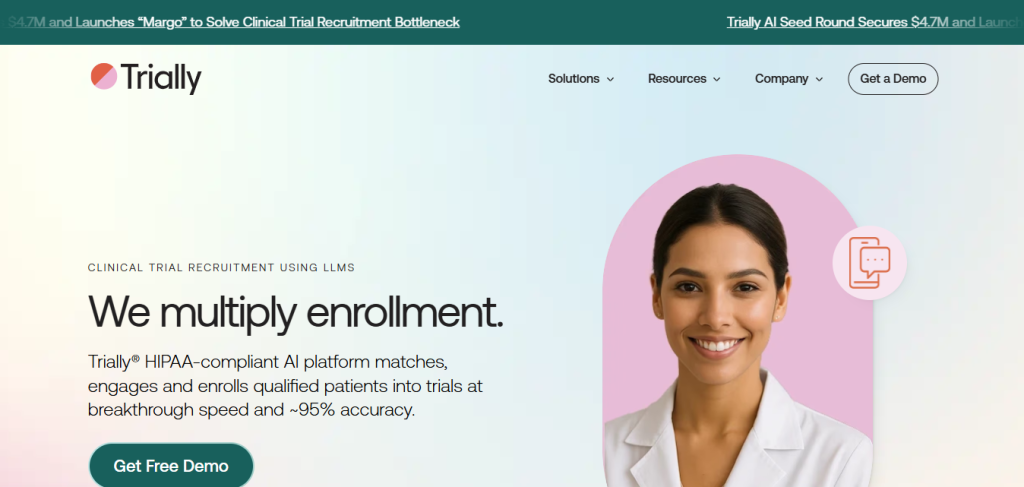Trially AI Raises $4.7 Million Seed Round to Transform Clinical Trials with Artificial Intelligence
September 21, 2025
byFenoms Startup Research

Trially AI, an emerging leader in clinical trial technology, has raised $4.7 million in Seed funding to accelerate the development of its AI-powered platform designed to revolutionize how clinical trials are conducted. The round attracted backing from a diverse group of investors, including Flyover Capital, Alpaca, Atria, Blu Ventures, Looking Glass Capital, Redbud, The Council, and Gaingels.
Founded by Kyle McAllister, Ramon Prieto, and Trevor W., Trially AI is on a mission to make clinical trials more efficient, transparent, and patient-centered by addressing the inefficiencies that slow down drug development and medical research.
Tackling One of Healthcare’s Biggest Bottlenecks
Clinical trials are the backbone of medical innovation, but they remain plagued by delays, high costs, and low enrollment rates. According to the Tufts Center for the Study of Drug Development, nearly 80% of clinical trials fail to meet enrollment timelines, and delays can cost sponsors anywhere from $600,000 to $8 million per day.
Trially AI is designed to address these pain points by using artificial intelligence and automation to:
- Streamline patient recruitment by matching candidates more efficiently.
- Optimize trial site selection based on historical and real-time data.
- Provide predictive insights that reduce dropouts and delays.
- Enhance trial transparency for both sponsors and participants.
In short, the platform reduces the friction between trial design and execution, ensuring that promising therapies reach patients faster.
Why Investors Are Backing Trially AI
The diversity of investors backing Trially AI speaks volumes about the confidence in its vision. Firms like Flyover Capital and Alpaca specialize in high-growth tech startups, while Gaingels has a track record of supporting inclusive, mission-driven founders. Together, they are providing Trially AI with both capital and networks to accelerate global adoption.
Investor enthusiasm is fueled by the sheer size of the opportunity. The global clinical trials market was valued at $52 billion in 2023 and is projected to reach $84 billion by 2030, growing at a CAGR of 7.1% (Grand View Research). With AI expected to reshape nearly every aspect of healthcare delivery, Trially AI is positioned at the intersection of two massive trends: AI adoption and life sciences innovation.
What stands out in Trially AI’s strategy is its focus on painkiller, not vitamin. Instead of building features that are “nice” but optional, Trially solved problems that bleed money daily for sponsors and CROs. Every day a trial is delayed, millions are lost. By tackling this exact pain point, Trially AI has turned its platform into a mission-critical tool rather than just another tech layer.
For founders, this is the lesson: the fastest path to traction isn’t building what’s cool, it’s building what’s costly to ignore. Trially AI demonstrates that startups win not by adding shiny features, but by solving the exact inefficiencies that drain budgets and stall growth in their chosen industries.
The Market Outlook: AI-Powered Clinical Trials
Healthcare is in the middle of a transformation, with AI taking center stage.
- AI in healthcare is projected to surpass $187 billion by 2030 (Precedence Research).
- Patient recruitment inefficiency accounts for nearly 30% of all trial failures (Clinical Trials Arena).
- Trials that leverage AI for recruitment and site selection have shown enrollment acceleration by up to 40% (Deloitte).
This shows that AI isn’t just a “nice-to-have” for clinical trials - it’s becoming an industry necessity.
And here’s the crucial founder insight: Trially AI didn’t attempt to replace clinical research - it focused on removing the inefficiencies that everyone in the industry accepts but hates. That strategic choice has positioned the company as a partner rather than a disruptor, making adoption easier for pharma sponsors and CROs alike.
How Trially AI Plans to Use the Funding
With $4.7 million in Seed funding, Trially AI intends to:
- Expand R&D efforts to refine its AI algorithms for recruitment and predictive analytics.
- Scale partnerships with pharmaceutical companies, CROs, and hospital systems.
- Grow its engineering and clinical operations teams to meet demand.
- Accelerate pilot programs across North America and Europe.
These initiatives will help Trially AI prove its model at scale and solidify its position as a trusted partner in the clinical trials ecosystem.
Standing Out in a Crowded Market
While several companies are exploring technology for clinical trials, many focus on niche solutions like patient engagement or data collection. Trially AI differentiates itself with a full-stack AI approach that touches multiple points in the trial lifecycle - recruitment, site selection, retention, and reporting.
This holistic view makes it more valuable to sponsors and CROs who prefer comprehensive platforms over piecemeal tools. It also positions Trially AI to become a long-term leader as AI adoption accelerates.
What’s Next for Trially AI
Looking ahead, Trially AI plans to strengthen its footprint in the U.S., Canada, and Europe, regions that together account for the majority of global trial activity. The company is also exploring applications of its AI for decentralized trials, which allow patients to participate remotely - another fast-growing segment of the industry.
If successful, Trially AI could redefine how therapies move from research to reality, shortening timelines for life-saving treatments and making clinical trials more accessible to diverse patient populations.
Conclusion
Trially AI’s $4.7 million Seed round is more than a funding milestone - it’s a statement about the future of clinical trials. By using AI to eliminate bottlenecks in recruitment, retention, and site selection, the company is tackling one of the biggest inefficiencies in healthcare.
For founders, the story of Trially AI underscores a timeless truth: the startups that scale fastest are the ones solving problems industries can’t afford to leave unsolved.









